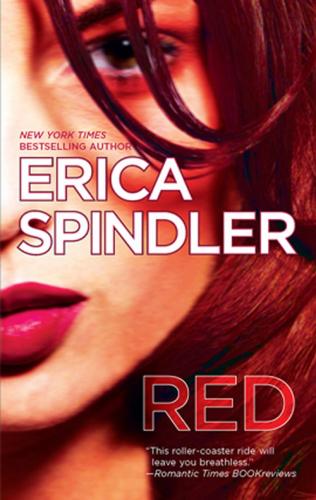Dear Reader,
If you know me through my thrillers, Red may surprise you. Red is a reissue of the 1995 novel that launched my career. Although this novel doesn’t contain my trademark mystery and high body count, it does offer readers other hallmarks of a Spindler novel: lots of drama and a fast-paced plot, characters you love—and love to hate—complex relationships and an emotional edge. I hope you find Red the novel I intended it to be: a big, fun, juicy read.
As always, I love to hear from my readers. You may contact me at P.O. Box 8556, Mandeville, LA 70470 or through my Web site, www.ericaspindler.com. In addition, visit my Web site to read my blog, learn about special promotions, freebies and to enter my monthly contest.
Thanks again and best wishes,
Red
Erica Spindler
To Nathan, my husband, my friend and my love.
For always being there, for weathering every emotional storm with calm, reason and love. I couldn’t do it without you.
Contents
Book One
Chapter 1
Chapter 2
Chapter 3
Chapter 4
Chapter 5
Chapter 6
Book Two
Chapter 7
Chapter 8
Chapter 9
Chapter 10
Book Three
Chapter 11
Chapter 12
Chapter 13
Chapter 14
Chapter 15
Chapter 16
Chapter 17
Chapter 18
Chapter 19
Chapter 20
Chapter 21
Chapter 22
Chapter 23
Chapter 24
Chapter 25
Chapter 26
Chapter 27
Chapter 28
Chapter 29
Chapter 30
Chapter 31
Chapter 32
Chapter 33
Book Four
Chapter 34
Chapter 35
Chapter 36
Chapter 37
Chapter 38
Chapter 39
Chapter 40
Chapter 41
Chapter 42
Chapter 43
Chapter 44
Chapter 45
Chapter 46
Book Five
Chapter 47
Chapter 48
Chapter 49
Chapter 50
Chapter 51
Chapter 52
Chapter 53
Chapter 54
Chapter 55
Chapter 56
Chapter 57
Chapter 58
Chapter 59
Chapter 60
1
Bend, Mississippi
1984
No place in the world smelled quite like the Mississippi Delta in July. Overripe, like fruit left too long in the sun. Pungent, like a drunk’s breath at the edge of a whiskey binge. Like sweat.
And it smelled of dirt. Sometimes so dry it coated the mouth and throat, but most times so wet it permeated everything, even the skin. Becky Lynn Lee lifted her hair off the back of her neck, sticky with a combination of perspiration and dust from the unpaved road. Most folks around Bend didn’t think much about the smell of things, but she did. She fantasized about a place scented of exotic flowers and rare perfumes, a beautiful world populated by people wearing fine, silky fabrics and welcoming smiles.
She knew that place existed; she’d seen it in the magazines she poured over whenever she could, the ones the women at Opal’s snickered at her interest in, the ones her father raged at her about.
None of that mattered. She had promised herself that someday, somehow, she would live in that world.
Becky Lynn picked her way across the railroad tracks used not only to ship rice, cotton and soybeans out of Bend, but to divide the good side of town from the bad, the respectable folk from the poor white trash.
She was poor white trash. The label had hurt, way back the first time she’d heard herself referred to by those words; it still hurt, when she thought about it. And she thought about it a lot. That’s the kind of town Bend was.
Becky Lynn lifted her face to the flat blue sky, squinting against the harsh light, wishing for cloud cover to temper the heat. Poor white trash. Becky Lynn had been three the first time she’d realized she was different, that she and her family were less than; she still remembered the moment vividly. It had been a day like this one, hot and blue. She’d been standing in line at the market with her mother and her brother, Randy. Becky Lynn remembered clinging to her brother’s hand and looking down at her feet, bare and dirty from their walk into town, then lifting her gaze to find the other mothers’ eyes upon them, their stares filled with a combination of pity and loathing. In that moment, she’d realized that there were others in the world and that they judged. She had felt strange, self-conscious. For the first time in her young life, she’d felt vulnerable. She had wanted to hide behind her mother’s legs, had wanted her mother to tell the other women to stop looking at them that way.
Becky Lynn supposed that had been back before her daddy had turned really mean, back when she still thought her mother to be an angel with magical, protective powers.
But maybe she had already realized that her mother wasn’t an angel, that her mother didn’t have the ability—or the strength—to make everything all right, because she hadn’t said anything. And the women had kept staring, and Becky Lynn had kept on feeling as if she had done something wrong, something ugly and bad.
Most times now, the respectable folks, even the customers she shampooed down at Opal’s Cut ‘n Curl, looked right through her. Oh, while she shampooed them they talked to her, but mostly because they liked to hear the sound of themselves and because they knew she was paid to listen and agree with them—something their husbands almost never did. But when they came face-to-face with her on the street, they looked right through her. She wasn’t sure if they pretended they didn’t see her because she was one of Randall Lee’s
